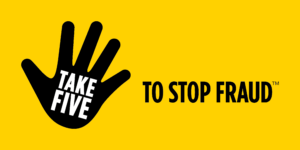Criminals use any opportunity to trick people into parting with their money. The Coronavirus pandemic is no exception.

Think before responding to unexpected letters, phone calls, emails or texts.
Be wary of messages and posts on social media.
The following details some of the scams reported:
Doorstep crime
- Callers claiming to be able to undertake a test for Covid-19, either for a fee or as a way of gaining entry to carry out theft.
- Criminals targeting older people on their doorstep and offering to do their shopping. Thieves take the money and do not return.
- Doorstep cleansing services that offer to clean drives and doorways to kill bacteria and help prevent the spread of the virus.
Online scams
Including emails, texts, social media and What’s App messages
- Scams that trick people into opening malicious attachments or links, which put people at risk of identity theft with personal information, passwords, contacts and bank details at risk. Some of these emails have lured people to click on attachments or links by
- claiming to be from the Department for Education, asking for bank details to receive support in place of free school meals
- claiming to be from the government, HMRC or local council offering a refund or grant
- claiming to be from a well known company offering a refund or grant
- claiming to be from the government and issuing a fine for leaving your house
- claiming to be from NHS Test and Trace
(see our post about NHS Test and Trace) - offering information about people in the local area who are affected by coronavirus.
- offering a voucher from a well known supermarket to help during the epidemic.
- claiming that your TV License direct debit has failed but offering a discount
- Fake online resources – such as false Coronavirus Maps – that deliver malware such as AZORult Trojan, an information stealing program which can infiltrate a variety of sensitive data. A prominent example that has deployed malware is ‘corona-virus-map[dot]com’.
- Websites which charge to register for government services (e.g.: vehicle Statutory Off Road Notification), which are free through the government website.
Refund scams
- Letters, phone calls, emails or messages claiming to be from HMRC or local council offering fake Income or Council Tax refunds
- Companies offering fake holiday refunds for individuals who have been forced to cancel their trips. People seeking refunds should also be wary of fake websites set up to claim holiday refunds.
Counterfeit goods
Sold online, by phone or door-to-door, these products, if supplied, can often be dangerous and unsafe. Other sellers may not deliver the goods and will use payment details given to steal money:
- Fake Covid-19 medicines or vaccines. Some products have been identified having toxic components.
- Fake Covid-19 testing kits
- Fake sanitisers. There are reports of some potentially harmful hand sanitiser containing glutaral (or glutaraldehyde), which was banned for human use in 2014.
- Fake masks. Some sellers are claiming to be from official bodies and saying that it is now compulsory to where a mask.
Telephone scams
- As more people self-isolate at home there is an increasing risk that telephone scams will also rise, including criminals claiming to be your bank, mortgage lender, utility company or government agency including NHS Test and Trace.
- The increase in working at home has lead to more cases of Computer Service Fraud, in which they phone claiming to be from computer supplier or manufacturer, Microsoft or your internet service provider and attempt to take control of your computer or tell you to install software which includes ransomware or spyware.
Donation scams
- There have been reports of thieves extorting money from consumers by claiming they are collecting donations for
- a COVID-19 ‘vaccine’.
- supplies for the NHS or other services
Loan sharks
- Illegal money lenders are expected to prey on people’s financial hardship, lending money before charging extortionate interest rates and fees through threats and violence
Employment Scams
Email or text invitation to an online meeting with your HR department or senior manager supposedly about redundancy or ermination of your contract. The meeting link is fake and steals your email or another password.
Investment Scam
Encouraging people to invest or to move their pensions or invesments to take advantage of the downturn caused by the pandemic
STOP
Taking a moment to stop and think before parting with your money or information could keep you safe.
CHALLENGE
Could it be fake? It’s ok to reject, refuse or ignore any requests. Only criminals will try to rush or panic you.
PROTECT
Contact your bank immediately if you think you’ve fallen for a scam and report it to Action Fraud.
Report Fraud
- Report to Kent Public Protection using the Citizens advice
- online form
https://www.citizensadvice.org.uk/consumer/get-more-help/report-to-trading-standards/ - telephone 0808 223 1133
- online form
- Report to Action Fraud
- online https://www.actionfraud.police.uk/reporting-fraud-and-cyber-crime
- by phone 0300 123 2040
- Report Phishing emails to the National Cyber Security Centre
Forward suspicious emails to report@phishing.gov.uk - Report to your bank if money has been taken illegally or your account security has been compromised
References and further information:
- Kent Public Protection
https://www.kentpublicprotection.info/covid19alerts - National Trading Standards:
https://www.nationaltradingstandards.uk/news/beware-of-covid19-scams/ - Action Fraud
https://www.actionfraud.police.uk/covid19 - Take Five
https://takefive-stopfraud.org.uk/coronavirus-fraud-and-scams/
#Scamaware

